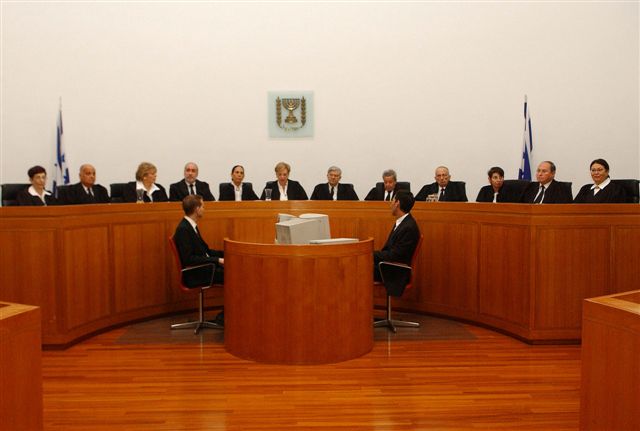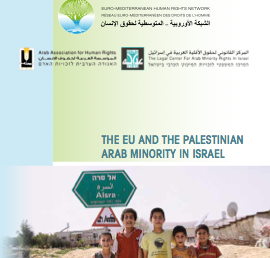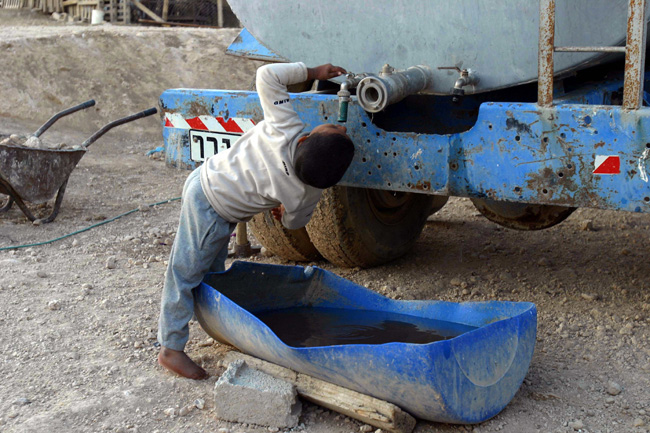UN Special Rapporteur on the Human Right to Safe Drinking Water and Sanitation
Ms. Catarina de Albuquerque
UN Special Rapporteur on the Human Right to Safe Drinking Water and Sanitation
Via email: srwatsan@ohchr.org; msaji@ohchr.org
Re: Update from Adalah on World Water Day 2012
Dear Professor de Albuquerque,
On World Water Day 2012, Adalah - The Legal Center for Arab Minority Rights in Israel, thanks you for your important efforts to secure the rights for safe drinking water and sanitation around the world. We follow your work closely, and look forward to an opportunity to welcome you to Israel/OPT sometime in the near future. Today, we would like to share our concerns and updates on our work to provide equal and adequate access to clean water to Palestinian citizens of Israel, and particularly, the Arab Bedouin community living in unrecognized villages in the Naqab (Negev). We welcome your attention and intervention on behalf of the Palestinian minority.
Access to Water in the Unrecognized Arab Bedouin Villages in the Naqab
Nearly 70,000 Arab Bedouin citizens of Israel live in 36 unrecognized villages in the Naqab. The State of Israel deliberately limits access to water in these villages, as well as all other basic services, as a means of forcing the Bedouin to give up their just land claims and move to government-planned townships, the poorest in Israel. As the Bedouin community struggles to remain on their ancestral land, most villagers obtain water via improvised, plastic hose hook-ups or unhygienic metal containers, which transport the water from a single water point located far from their homes, causing health risks and daily hardships. The ramifications for health caused by the State‘s refusal to provide running water to the residents of the unrecognized villages are potentially severe, and have a role to play in the high and rising infant mortality rates among the Arab Bedouin population in the Naqab.
Some 30,000 Arab Bedouin live in 10 recently-recognized villages, which, though recognized by Israel in the early 2000s, still lack many basic municipal services such as sewage, paved roads, and electricity. In these villages, though the ability to demand drinking water is strengthened, the villagers are still required to lay and maintain the water pipes that connect their homes to communal water centers. Further, the government refuses to grant subsidies to Bedouin farmers who want to use their land for agriculture. As such, Bedouin farmers in recognized villages are denied the right to cultivate their ancestral land, while neighboring Jewish farmers benefit greatly from government subsidies on water for agriculture. On World Water Day 2012, Adalah is highlighting the stories of 4 Arab Bedouin citizens of Israel in both unrecognized and recognized villages who through photos demonstrate the daily challenges of access to water.
Lack of Enforcement of Supreme Court decision to provide "Minimal Access to Water" in the Unrecognized Villages
In June 2011, the Israeli Supreme Court , in a precedent-setting ruling, determined that the right to water was a constitutional right stemming from the right to dignity. While the court did find that withholding basic services was a legitimate tool of the government to pressure the Arab Bedouin to give up their land claims and move to planned townships, it nonetheless concluded that Arab Bedouin citizens of Israel living in the unrecognized villages were entitled to "minimal access to water."Following the ruling, Adalah sent an application to the Israeli Water Board requesting that the three unrecognized villages directly affected by the Supreme Court‘s decision be connected to the public water network. The Water Board denied the application, stating that the villages already have "minimal access to water" given that the residents could purchase water tanks and fill them in nearby villages or move from unrecognized villages to recognized towns. Adalah appealed the decision to the Water Tribunal arguing that these proposals fail to safeguard the basic rights of the villagers. The appeal was rejected in January 2012. Adalah is now appealing to the Supreme Court to define "minimal access to water" and to ensure respect for the Arab Bedouin community's right to water.
Requesting Attention and Intervention
As we commemorate World Water Day 2012, Adalah hopes that you will join us in calling on Israel to provide equal, adequate access to water to all its citizens in the Naqab. The international community has repeatedly raised its concerns regarding the situation of denying and/or limiting access to clean water in the unrecognized Bedouin villages. We have collected all of the relevant concluding observations regarding access to water in the Naqab, and would be grateful if you would issue anurgent letter or appeal urging the State of Israel to implement the recommendations of the international community, and to enforce the decision of its Supreme Court.
Thank you for your attention and we look forward to continuing to work together to secure the fundamental right to water for all.
Sincerely,
Hassan Jabareen, Adv.
General Director, Adalah

















